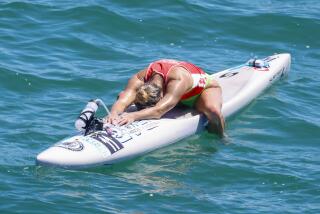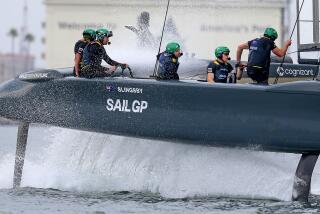The Buddy System Is Under Sail : Melges’ Cup Challenge Starts in Mid-America
- Share via
Some of the America’s Cup skippers had been at Perth for weeks and others were on their way, but all last week Buddy Melges was as far from those turbulent tides and times as sailing would permit.
Perth could wait. As the tension built, Melges was tuning up for the world’s greatest sailing event by racing a scow on Okoboji Lake in northwestern Iowa.
“They were very thrilled to have me there,” Melges said by phone after returning to his home on Lake Geneva, Wis. “Everybody in the Midwest is hyped over the Heart of America Challenge.”
If the Dallas Cowboys were once America’s team, Heart of America may be America’s boat.
The sailing Establishment, Melges says, is under the delusion that there is an East Coast and a West Coast and nothing in between. Melges, by contrast, counts his constituency in farmers and 4-H Clubs and all the folks in Small Town, USA--not quite from sea to shining sea but far more than just among the amber waves of grain.
“We call Heart of America anything east of Interstate 5 and west of Interstate 95 (on the East Coast),” Melges said. “That’s the Heart of America.”
While other syndicates are wearing out their knuckles knocking on corporate doors, Heart of America is raising money another way. “We sell T-shirts all over the Midwest,” Melges said. “They’ve turned in about a $15,000 clear weekly profit off selling T-shirts.”
Only in America.
When the Chicago Yacht Club launched its challenge, Harry C. Melges Jr. was the first choice to run the boat. Really, the only choice.
Through building and sailing scows, iceboats and other inland lake craft, the man the natives call the Wizard of Zenda (Wis.) has maintained his Midwest identity, although perhaps at the expense of proper status in the big-time sailing fraternity. That is, scows and iceboats are one thing, but what would Melges do if he ever saw a wave ?
“They always thought: ‘This hack from the Midwest,’ ” he said. “But Mother Nature challenges us on our water here just as much as she does sailing around the coast areas that I’ve sailed on.”
Sometimes, Melges has answered the skeptics, forcefully. In 1964 he won an Olympic bronze medal in the Flying Dutchman class. In ’71 he stepped into a Soling, redesigned the rig and won every race in his first major regatta at Cork, Ireland. A year later he won the Olympic gold.
And if Star boats, the world’s oldest, largest and most competitive one-design class, were the steppingstones to sailing immortality, Melges cruised into the Valhalla of Lowell North, Paul Elvstrom and Dennis Conner by winning the world championships in ’78 and ’79.
“Dennis told me I didn’t have a prayer in ‘78,” said Melges, who hadn’t practiced as much as his rivals. “But I had spent my time making a better set of sails.”
Melges, 55, is sort of a Will Rogers without a rope. He likes to tweak the Establishment with biting humor, and for a long time he found the America’s Cup crowd tiresome.
“Years ago I said, if I was ever going to do a 12-meter program I’d get a divorce and go to AA (Alcoholics Anonymous) and get that out of the away, because those are two inevitables that happen when it’s over,” he said. “But so far my wife still loves me, and I don’t think I’m into alcoholic convulsions. I do enjoy my glass of wine and a beer in the evening, but we want to share these experiences we’re having with the sailing public and the public in general.
“We’re trying to keep our challenge on a light and airy mode. It’s important that everyone enjoys this effort we’re making. We’re very serious about it, but we’re not going to go off the deep end.”
He changed his mind about the America’s Cup when the Australians won it in ‘83, Melges said.
“The reason I’m in it is twofold,” he said. “I said I didn’t want to necessarily lose the cup, but now that Dennis (Conner, who lost to the Aussies) has given us this opportunity to go win it back for the heart of America, this is something that tickled my fancy. And I felt I really needed another challenge.”
And now they’re saying that Melges doesn’t have a chance because he has never done much match racing and his big-boat experience is so limited. He has spent all of this year trying to catch up, although it meant shoveling snow off his old trial boat, Clipper, to sail against the Canadians in 10-degree temperatures off Victoria last winter.
Later, he practiced against Golden Gate’s Tom Blackaller in San Francisco Bay. Almost everyone in sailing gets along with Melges, a mellow Midwesterner, but that series ended with hard feelings all around, and Melges felt badly used.
“In the match racing game where you’ve got only one other boat out there, things get pretty aggressive,” he said. “That doesn’t bother me. I like to be aggressive, but I respect other people’s equipment and I certainly don’t want to ram into them. We had one little bump that was unnecessary there, and it really rattled my cage.
“There’s going to be a lot more than that. I guess the Australians had a situation where they almost sank one boat over there.”
When Melges returned west with his new boat, Heart of America, he went farther south to Santa Cruz and trained only with the Canadians.
“But our experience in sailing San Francisco Bay kept us going in February, March and April when the only thing we could have done in the Midwest is sail iceboats,” he said. “And we won more than our share of races, better than 50% against all those guys.”
He was even more encouraged when his new boat proved superior to one of the Canadian boats, True North, which placed sixth in the 12-meter world competition at Perth last February and has since been discarded in favor of the merged Canadian syndicates’ updated Canada II.
“True North was our tie-in to all the other 12-meter boats in the world, and Santa Cruz gave us the sea conditions and wind conditions (of Perth),” Melges said. “We spent eight weeks there sailing in up to 35 knots of wind and got our boat to hold together and sailed very nicely.”
Some America’s Cup skippers complain about how difficult it is to sail a 12-meter. Most try to avoid even docking one of the ungainly, 65-foot beasts without assistance because they have no auxiliary engines. Not Melges.
“Some people put these 12-meters on too high a pedestal,” he said. “We went right down to the dock, main (sail) up, spinnaker up halfway down the harbor, dropped her spinnaker, did a little buttonhook, backed the main and (drifted) right into position. The boys were so good at it that I imagine it might come in handy around the starting procedure, knowing how to handle the boat the way they do.”
No matter what happens when elimination racing starts off Perth Oct. 5, Heart of America has survived numerous blows to get this far.
First it had to go to court to establish that Lake Michigan was “an arm of the sea” and therefore qualified as a defense site, should Melges win it all in Australia.
“Now the sailors on Lake Michigan are complaining about how salty it’s getting,” Melges said. “You can’t win.”
There has been an ongoing fight for funds, as all American syndicates have experienced, but the T-shirts have helped.
Finally, tactician Gary Jobson, who rode to victory with Ted Turner in ‘77, resigned in May to work the America’s Cup for ESPN. Melges had leaned heavily on Jobson for match-racing expertise.
“I thought that Jobson brought a lot of that basic concept to us,” Melges said. “I mean, I had a good feeling for what it was, but Gary brought a lot of good moves to us. We lived together for six months, talking about it.”
But Melges seems to have found a strong replacement for Jobson in Dave Dellenbaugh, who has written a book on the racing rules and in this year’s Congressional Cup did very well in a tough field of America’s Cup skippers, tying New Zealand’s Chris Dickson for third and finishing ahead of Eagle’s Rod Davis and Australia IV’s Colin Beashel.
“Dave comes in as a formidable match racer and tactician,” Melges said. “He’ll be able not only to enhance that aspect, but he’ll be the man that’ll take our problems to the (protest) room. I’ll go off and take a nice hot shower and relax.”
That’s what Melges was doing out on Okoboji Lake last week, in his own way. He sailed one of his own 28-foot E-scows to first in class with three firsts and three seconds in six races. Melges always has maintained that in smooth water, a flat bottomed scow is faster than a 12-meter anytime.
“It was very exciting racing,” he said. “It’s fun to get back into a scow, a real high-performance boat, and sail in the shifty winds on the lake. It’s a challenge every minute. Some of my 12-meter boys were with me, and they got a particularly big charge out of it. They hadn’t gone that fast or experienced so much great tactics out on the race course.”
The final question, then, is how Melges, the Midwest legend, will do out on the Indian Ocean against the best of the young hotshot sailors from the rest of the world. Bill Shoemaker and Jack Nicklaus may have set his stage.
“I think I’m in good enough shape to handle arm wrestling with any of those youngsters,” he said. “And on the race course, the old guy will hang in there just fine. Yachting is a slow enough moving game, and certainly steering a 12-meter doesn’t require much strength. We’ll be all right.”
More to Read
Sign up for The Wild
We’ll help you find the best places to hike, bike and run, as well as the perfect silent spots for meditation and yoga.
You may occasionally receive promotional content from the Los Angeles Times.






